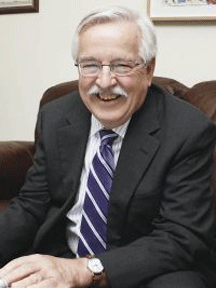By Lindsay Elliott-Foose
Recognized as one of the most influential people in today’s understanding of anthropology as a field, William (Bill) Davis is retiring as head of the American Anthropological Association after sixteen years. In his time as executive director, he strived to increase membership and make anthropology accessible and understandable to the public.
When Davis was offered the position of executive director at the American Anthropological Association in 1996, he had never worked in anthropology. Instead, he had completed his undergraduate and advanced degrees in political science at Syracuse University and had spent the past two years as executive director of the U.S. Advisory Commission on Intergovernmental Relations. Prior to that, he was the director of the Center for Education and Information Resources, director of Election ’88, and director of the Office of Policy Analysis and Development at the National League of Cities. He also served on the boards of the American Council of Learned Societies, the U.S. National Committee for the International Union of Anthropological and Ethnological Sciences, the Consortium of Social Science Associations, the American Society for Public Administration, and the Greater Washington Society of Association Executives. Davis credits his leadership abilities in large part to his experience at these associations, allowing him to take on the considerable responsibilities as executive director of the American Anthropology Association.
When Davis joined the association in 1996, it was already the world’s largest anthropological association with a membership of about 11,000 people. The association published twenty journals, all in paper format and circulation was primarily limited to scholarly libraries. He set out with an ambitious long-term plan — to retain control over the publication process and content, while making it more accessible to a larger audience.
As he retires, the American Anthropological Association has digitized over 100 years of past publications and scholarship, and it is currently publishing twenty-two journals online, diversifying audiences, and increasing membership. In addition, Davis was also able to reach out to new member pools through traveling exhibitions about anthropology, focused on the understanding of race. Under his direction, three such exhibits have been completed in locations as diverse as the Mayo Clinic, Wright Museum of African American History, and the Smithsonian National Museum of Natural History. He has also increased membership at meetings by about fifty percent, proving that there is still a strong desire to pursue anthropology as a scholarly career.
So what’s next for Davis after forty years of experience in board and committee leadership and a sixteen year legacy at the American Anthropological Association? With a lot of experience and wisdom to offer at age seventy-four, Davis is looking forward to a period of reflection and writing which will culminate in a book pulling from his experiences over the past forty years, as well as starting his own consulting business — providing training and coaching to board and committee leaders.
Lindsay Elliott-Foose is a junior at Carnegie Mellon University pursuing degrees in Global Studies and Decision Science. Carnegie Mellon is home to the Upsilon of Pennsylvania chapter of Phi Beta Kappa.




